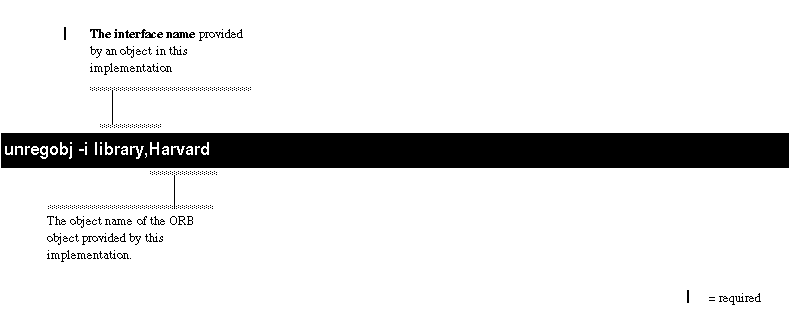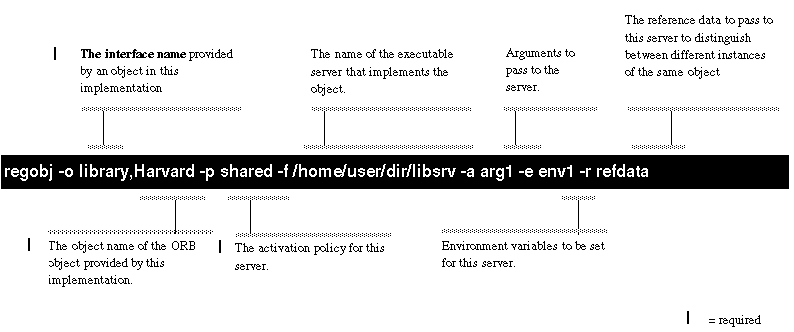Unregistering with unregobj
Theunregobj command can be used to unregister an object implementation from the command line or from within code. If the interface name is specified by itself, all objects instances associated with that interface name will be unregistered. You can specify both the interface and object name if you only wish to unregister a specific object within an interface. For complete information on using this command, see the Netscape Internet Service Broker for C++ Reference Guide.
 Figure 4.2 The unregobj command.
Figure 4.2 The unregobj command.

 For information about the Windows implementation of
For information about the Windows implementation of unregobj, see the "Commands" chapter of the Netscape Internet Service Broker for C++ Reference Guide.
Unregistering with the BOA::dispose Method
An object's implementation can use theBOA::dispose method to unregister an ORB object. Any connections that exist between a client application and the object will be terminated as soon as the object is unregistered.
The BOA::dispose method.
class CORBA {
class BOA {
...
virtual void dispose(Object_ptr);
...
};
};
The listimpl Command
You can use thelistimpl command to list the contents of a particular implementation repository. For each implementation in the repository, the listimpl command lists all the object instance names, the path name of the executable program, the activation mode, and the reference data. Any arguments or environment variables that are to be passed to the executable program are also listed. For complete details on using this command see the Netscape Internet Service Broker for C++ Reference Guide.
Figure 4.3 The listimpl command.

 For information about the Windows implementation of
For information about the Windows implementation of listimpl, see the "Commands" chapter of the Netscape Internet Service Broker for C++ Reference Guide.
ORB Interface to the OAD
The Object Activation Daemon is implemented as an ORB object. The code listing below shows the IDL interface specification for the OAD. You can create a client application that binds to the OAD and uses this interface to query the status of objects that have been registered. The OAD interface specification.// IDL
module Activation
{
enum State {
ACTIVE,
INACTIVE,
WAITING_FOR_ACTIVATION
};
struct ObjectStatus {
long process_id;
State activation_state;
Object objRef;
;
typedef sequence<ObjectStatus> ObjectStatusList;
struct ImplementationStatus {
CORBA::CreationImplDef impl;
ObjectStatusList status;
};
typedef sequence<ImplementationStatus> ImplStatusList;
exception NotRegistered {};
...
interface OAD {
// Internal methods are not shown here.
...
// Get status info for a given implementation
ImplementationStatus get_status(in string interface_name,
in string object_name)
raises (NotRegistered);
// Get status of all implementations for a given interface
ImplStatusList get_status_interface(in string interface_name)
raises (NotRegistered);
// Get list of all registered interfaces.
ImplStatusList get_status_all();
...
Activating Objects Directly
Direct activation of an object involves instantiating all the C++ implementation classes, invoking theBOA::obj_is_ready method for each object and then invoking BOA::impl_is_ready to begin receiving requests. The following code example shows how this processing would occur for a server offering two Library objects; one with the object name of "Stanford" and the other named "Harvard." Once the objects have been instantiated and activated, the server invokes BOA::impl_is_ready to begin receiving client requests.
